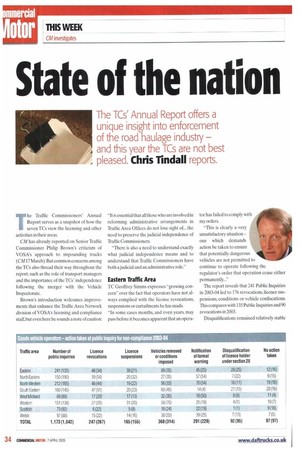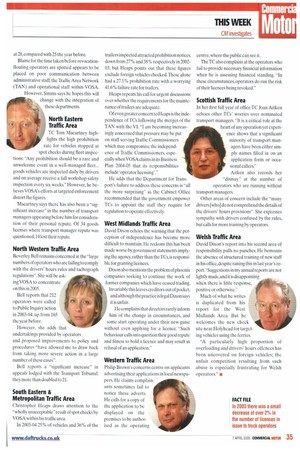State of the nation
Page 34

Page 35

If you've noticed an error in this article please click here to report it so we can fix it.
The TCs' Annual Report offers a unique insight into enforcement of the road haulage industry — and this year the TCs are not best
pleased. Chris Tindall reports.
The Traffic Commissioners' Annual Report serves as a snapshot of how the seven TCs view the licensing and other activities in their areas.
CM has already reported on Senior Traffic Commissioner Philip Brown's criticism of VOSA's approach to impounding trucks (CM 17 March). But common concerns among the TCs also thread their way throughout the report, such as the role of transport managers and the importance of the TCs' independence following the merger with the Vehicle Inspectorate.
Brown's introduction welcomes improvements that enhance the Traffic Area Network division of VOSA's licensing and compliance staff, but even here he sounds a note of caution: "It is essential that all those who are involved in reforming administrative arrangements in Traffic Area Offices do not lose sight of... the need to preserve the judicial independence of Traffic Commissioners.
"There is also a need to understand exactly what judicial independence means and to understand that Traffic Commissioners have both a judicial and an administrative role."
Eastern Traffic Area TC Geoffrey Simms expresses "growing concern" over the fact that operators have not always complied with the license revocations, suspensions or curtailments he has made.
"In some cases months, and even years, may pass before it becomes apparent that an opera tor has failed to comply with my orders.
"This is clearly a very unsatisfactory situation — one which demands action be taken to ensure that potentially dangerous vehicles are not permitted to continue to operate following the regulator's order that operation cease either permanently..."
The report reveals that 241 Public Inquiries in 2003-04 led to 176 revocations, licence suspensions, conditions or vehicle confiscations. This compares with 135 Public Inquiries and 90 revocations in 2003.
Disqualifications remained relatively stable at 28, compared with 25 the year before. Blame for the time taken before revocationflouting operators are spotted appears to be placed on poor communication between administrative staff. the Traffic Area Network (TAN) and operational staff within VOSA. However, Simms says he hopes this will . change with the integration of these departments.
North Eastern Traffic Area
TC Tom Macartney highlights the high prohibition rate for vehicles stopped at spot checks during fleet inspections: "Any prohibition should be a rare and unwelcome event in a well-managed fleet... goods vehicles are inspected daily by drivers and on average receive a full workshop safety inspection every six weeks." However, he believes VOSA's efforts at targeted enforcement distort the figures.
Macartney says there has also been a "significant increase" in the number of transport managers appearing before him for consideration of their personal repute. Of 34 goods licenses where transport manager repute was questioned, 14 lost their repute.
North Western Traffic Area
Beverley Bell remains concerned at the "large numbers of operators who are failing to comply with the drivers' hours rules and tachograph regulations". She will be askingVOSA to concentrate on this in 2005.
Bell reports that 212 operators were called to Public Inquiry action in 2003-04, up from 165 the year before.
However, she adds that undertaking provided by operators and proposed improvements to policy and procedures "have allowed me to draw back from taking more severe action in a large number of these cases".
Bell reports a -significant increase" in appeals lodged with the Transport Tribunal; they more than doubled to 21.
South Eastern & Metropolitan Traffic Area
Christopher Heaps draws attention to the "wholly unacceptable" result of spot checks by VOSA within his traffic area.
In 2003-04 25% of vehicles and 36% of the trailers inspected attracted prohibition notices, down from 27% and 38% respectively in 200203, but Heaps points out that these figures exclude foreign vehicles checked.These alone had a 27.1% prohibition rate with a worrying 41.6% failure rate for trailers.
Heaps repeats his call for urgent discussions over whether the requirements for the maintenance of trailers are adequate.
Of even greater concern to Heaps is the independence of TCs following the merger of the TAN with the VI. "I am becoming increasingly concerned that pressure may be put on staff serving Traffic Commissioners which may compromise the independence of Traffic Commissioners, especially when VOSA claims in its Business Plan 2004-05 that its responsibilities include 'operator licensing'."
He adds that the Department for Transport's failure to address these concerns is "all the more surprising" as the Cabinet Office recommended that the government empower TCs to appoint the staff they require for regulation to operate effectively.
West Midlands Traffic Area
David Dixon echoes the warning that the perception of independence has become more difficult to maintain. He reckons this has been made worse by government statements implying the agency, rather than the TCs, is responsible for granting licences.
Dixon also mentions the problem of phoenix companies seeking to continue the work of former companies which have ceased trading. Invariably this leaves creditors out of pocket, and although the practice is legal Dixon says it is unfair.
He complains that directors rarely inform him of the change in circumstances, and some start operating under their new guise without even applying for a licence. "Such behaviour calls into question their good repute and fitness to hold a licence and may result in refusal of an application."
Western Traffic Area
Philip Brown's concerns centre on applicants advertising their applications in local newspapers. He claims complainants sometimes fail to notice these adverts. He calls for a copy of the application to be displayed on the premises Lobe authorised as the operating centre, where the public can see it.
The TC also complains at the operators who fail to provide necessary financial information when he is assessing financial standing. "In these circumstances, operators do run the risk of their licences being revoked."
Scottish Traffic Area
In her first full year of office TC Joan Aitken echoes other TCs' worries over nominated transport managers. It is a critical role at the heart of any operation yet experience shows that a significant minority of transport managers have been either simply names filled in on an application form or occasional callers."
Aitken also records her -dismay" at the number of operators who are running without transport managers. Other areas of concern include the "many drivers [who] do not comprehend the details of the drivers' hours provisions". She expresses sympathy with drivers confused by the rules, but calls for more training by operators.
Welsh Traffic Area
David Dixon's report into his second area of responsibility pulls no punches. He bemoans the absence of structured training of new staff in his office, despite raising this in last year's report ."Suggestions in my annual reports are not lightly made, and it is disappointing when there is little response, positive or otherwise."
Much of what he writes is duplicated from his report for the West Midlands Area. But he welcomes the new check site near Holyhead for targeting vehicles using the ferries.
"A particularly high proportion of overloading and drivers' hours offences has been uncovered on foreign vehicles; the unfair competition resulting from such abuse is especially frustrating for Welsh operators." •
















































































































































































































